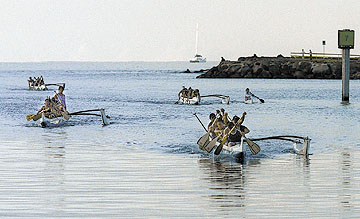
|
| Paddling allows participants to exercise while enjoying one of Hawai'i's most alluring natural playgrounds, the ocean.
Advertiser library photo |
Whether on a solo kayak or a six-person canoe, the art and labor of paddling provides a healthful opportunity to enjoy Hawai‘i’s most alluring natural playground — the ocean.
That’s the consensus among our panel of health and fitness experts, whose collective appraisal places the activity at No. 6 on our list of the top outdoor activities in Hawai‘i.
"It’s a wonderful workout," said Jeff Deininger, health and fitness director for the YMCA. "It uses the health and fitness principles, and at the same time it gives you an opportunity to learn about the ocean — how to read it and how to work with it."
To the degree that any rigorous activity shapes the body to its specific demands, a paddlers’ body speaks to the challenge finding accord between vessel and ocean.
Broad shoulders, a straight back and muscular arms are slowly developed as a paddler learns, through endless repetitions, how best to transfer his energy through the paddle. Lower back and abdominal muscles gird to stabilize the body, while at the same time relaxing enough to allow the cardiovascular system to take in an increased amount of oxygen.
The movements are different for kayaking and canoeing, but the benefits are similar: powerful upper body development and sound aerobic fitness through sustained exertion. Both activities also promote trunk flexibility, a key factor in effectively using upper body strength.
Angela Wagner, program manager for the state Department of Health’s Health Promotion and Education Branch and coordinator for Kaho‘omiki, Hawai‘i’s Council on Physical Activity, said kayaking has the advantage in terms of access.
"Paddling teams are a little different because you’re somewhat limited in when you can get everybody together," she said. "Not many people can afford to get their own canoe. With a kayak, there is some initial expense but it isn’t as much and kayaks last forever."
Paddling with a club has some clear benefits, none more important than close instruction in the science and technique of efficient paddling.
Given the seated position of the paddlers on the canoe, the danger of back and shoulder injuries can be great if bodies aren’t aligned properly or if the action of stroke isn’t correct.
"Learning proper technique is really important to avoid repetitive motion injuries as well as muscle strains," said Dennis Chai, a professor of kinesiology and leisure science at the University of Hawai‘i.
Most canoe clubs also require members to undertake a rigorous overall fitness program, which may include running, strength training and stretching. Some canoe clubs also educate members on the historical and cultural significance of the sport to Hawai‘i, as well as environmental-use issues.
As with any ocean activity, the safety of the participants greatly depends on how well they learn and practice basic water safety skills and habits. For kayakers, this means paddling with a companion and, if possible, carrying a cellular phone. Both kayakers and canoe paddlers need to know how to right an upturned vessel, how to read swells and currents, and what to do in the event of an emergency.
"There’s a lot you have to know if you’re going to paddle safely," Wagner said. "You have to know where you’re going and how the weather affects ocean conditions. You have to know how to read the ocean."

 The good. Vigorous, sustained paddling provides an excellent cardiovascular and muscular workout. Paddling also affords recreational athletes a chance to view the Islands and their surrounding waters from a unique, often breathtaking, perspective. The good. Vigorous, sustained paddling provides an excellent cardiovascular and muscular workout. Paddling also affords recreational athletes a chance to view the Islands and their surrounding waters from a unique, often breathtaking, perspective.
 The bad. Rental fees, club memberships and equipment purchases can be costly. Ocean conditions can be difficult to read, even for experienced paddlers. The bad. Rental fees, club memberships and equipment purchases can be costly. Ocean conditions can be difficult to read, even for experienced paddlers.
 Watch out for: Back and shoulder strains, repetitive motion injuries, unstable ocean conditions. Watch out for: Back and shoulder strains, repetitive motion injuries, unstable ocean conditions.
 Getting started: Kayaks are relatively inexpensive to rent, but be sure to get a complete safety briefing and adequate instruction on how to handle the vessel before you head out. It may be safer to reserve a space on a guided kayak tour and get some supervised experience. For canoe paddlers, many local clubs offer free or low-cost membership to beginners who do not intend to compete. Memberships can be upgraded later. Getting started: Kayaks are relatively inexpensive to rent, but be sure to get a complete safety briefing and adequate instruction on how to handle the vessel before you head out. It may be safer to reserve a space on a guided kayak tour and get some supervised experience. For canoe paddlers, many local clubs offer free or low-cost membership to beginners who do not intend to compete. Memberships can be upgraded later.
 The last word: "There’s so much more to paddling than just the sports aspect," said Kaweo Leong of Pearl City. "When you paddle, you really connect with the culture and the spirit of Hawai‘i." The last word: "There’s so much more to paddling than just the sports aspect," said Kaweo Leong of Pearl City. "When you paddle, you really connect with the culture and the spirit of Hawai‘i."
[back to top] |

